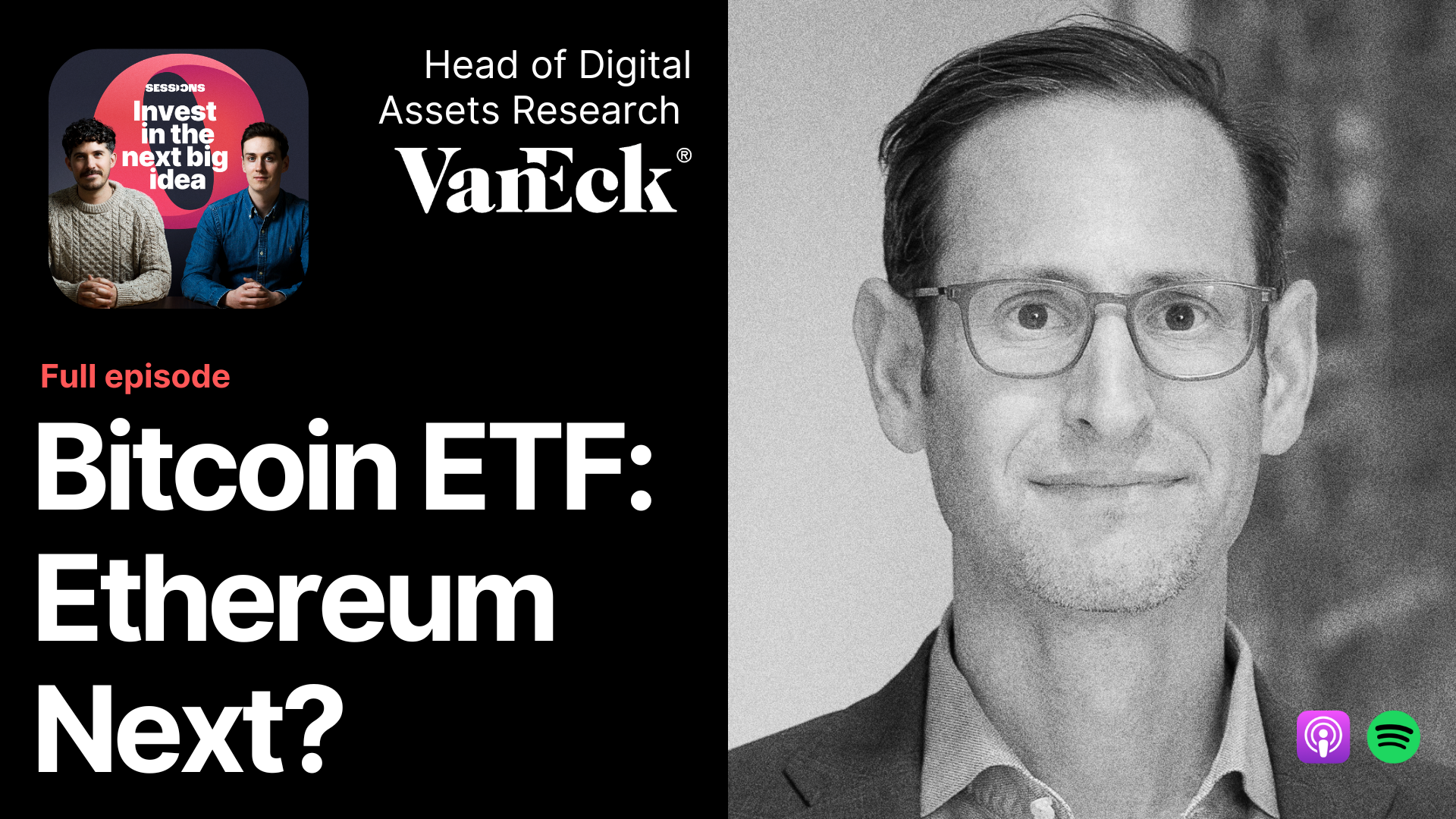Matthew Sigel, Head of Digital Assets Research at VanEck, joins OPTO Sessions to discuss the significance of the newly approved spot bitcoin ETFs, as well as how he thinks they will impact the behaviour of institutional and retail investors, and the various new products for which they could pave the way.
Matthew Sigel is Head of Digital Assets Research at VanEck. Prior to joining the firm, Sigel was a portfolio strategist and author of the widely read HELLO INVESTORS newsletter at CLSA, where he spent 10 years in sales and research.
Sigel has also worked as an analyst and portfolio manager on the AllianceBernstein US and Global Thematic Equity Funds, where he covered technology and other sectors for Chief Investment Officer Cathie Wood, now CEO of ARK Invest. He has also worked as a financial journalist at Bloomberg, CNBC and NHK Japan Broadcasting.
While Sigel operates out of the company’s New York office, VanEck also has an office in Amsterdam, with European legislators having historically been better disposed towards listing spot cryptocurrency ETFs.
It already has established bitcoin and ethereum ETFs as a result: the VanEck Bitcoin Strategy ETF [XBTF], which launched in 2021 and is being delisted at the end of January, and the VanEck Ethereum Strategy ETF [EFUT], which launched on 2 October 2023.
Bitcoin ETFs on the Spot
The Securities and Exchange Commission (SEC) approved 11 spot bitcoin ETFs on 11 January, marking a watershed moment for cryptocurrencies, as they are now more readily available for US-based investors.
“We’ve been optimistic that the most appealing part of these ETFs is their cost savings for retail, and the security advantages for institutional investors,” Sigel tells OPTO Sessions.
He explains that retail investors buying cryptocurrencies through an exchange such as Coinbase [COIN] pay a 2.5% transaction cost. Spot bitcoin ETFs — including VanEck’s latest offering, the VanEck Bitcoin Trust [HODL] — provide “a sizable all-in cost saving to the end investor that we think will be compelling”.
He also believes that the ETFs will facilitate greater participation in cryptocurrency speculation from Wall Street. “The killer use case for bitcoin is obviously to hold it and self-custody it and be able to transact with anyone in the world 24/7, 365 days a year,” he says. “The ETFs don't enable that, but they do make it a lot easier for Wall Street to speculate on this asset. That’s still an important part of the capital formation process.”
Balancing Volatility
In terms of the ideal weighting to allocate to a bitcoin ETF in a portfolio, Sigel observes that, given bitcoin’s outperformance over other assets since its inception, “it just always looks better” to hold more.
“The challenge for advisors is to strike the right balance around the volatility that they’re willing to subject their clients to. We land at the 2–4% range, but everyone’s got to have their own view on that.”
Sigel points out that bitcoin has approximately four times the annualised volatility of the S&P 500; there are significant risks of drawdowns that investors need to keep in mind.
“There’s high octane in that tank. The investors who we’ve engaged with are willing to handle a 70% drawdown and add more in that situation.”
Sigel advocates a buy-and-hold — perhaps better known as the ‘hold on for dear life’ (HODL) strategy — or dollar-cost averaging approach to building a position in bitcoin.
“This is an asset that’s just uniquely disposed to dollar-cost averaging. We’re a big fan of dollar-cost averaging. The crypto meme for that is HODL: always be buying. The trad fi (traditional finance) equivalent is dollar-cost averaging.”
Beyond Bitcoin
Are Ethereum ETFs just around the corner?
Following the launch of spot bitcoin ETFs, speculation is rife over the range of products that could follow VanEck’s aptly named HODL ETF. According to Sigel, sponsors are filing covered call strategies (i.e., generating income by selling bitcoin call options) and leveraged products.
“There are 1.5x and 2x levered — both long and short — bitcoin products that have been filed,” says Sigel. Given that these products “require credit to operate”, Sigel speculates that their inception could “catalyse a new bitcoin credit cycle”.
“If they approach the Ethereum futures market through the same lens, then there should be room for a spot Ethereum ETF — but that’s an open question”
Assuming the SEC adopts the same approach to Ethereum as it did to bitcoin, there could be a spot Ethereum ETF in the foreseeable future. Indeed, Sigel is limited as to what he can say on the matter, given that VanEck has filed for a spot Ethereum ETF. However, he notes that “for bitcoin, they use the existence of the futures market: ‘a regulated market of significant size’ is the wording.
“If they approach the Ethereum futures market through the same lens, then there should be room for a spot Ethereum ETF — but that’s an open question.”
Global adoption of digital assets
Sigel highlights a number of global tailwinds for digital asset adoption. For example, the BRICS bloc has been expanded to include countries like Saudi Arabia, the UAE, Iran, Egypt and Ethiopia. And at the end of 2023, the Nigerian central bank lifted a ban on bitcoin trading, and a prominent cleric declared bitcoin trading acceptable under Islam.
“Argentina’s new administration declared that contracts settled in bitcoin would be legal under certain conditions,” says Sigel.
Additionally, he believes that, with such a high percentage of the world’s population voting in elections this year, further tailwinds for digital assets could be ahead. “There’s a lot of opportunity for disruption, change, uncertainty and then resolution. Markets tend to love that environment.”
At the same time, he concedes that some countries are “getting strong-armed by the IMF and others forces to take a stronger anti-crypto policy footing than they might normally”.
However, he feels that this heavy-handed approach is creating its own counter-trend of adoption, as in Argentina and El Salvador, “to piss off some of these multilateral institutions”.
LINKS TO THE INTERVIEW:
Disclaimer Past performance is not a reliable indicator of future results.
CMC Markets is an execution-only service provider. The material (whether or not it states any opinions) is for general information purposes only, and does not take into account your personal circumstances or objectives. Nothing in this material is (or should be considered to be) financial, investment or other advice on which reliance should be placed. No opinion given in the material constitutes a recommendation by CMC Markets or the author that any particular investment, security, transaction or investment strategy is suitable for any specific person.
The material has not been prepared in accordance with legal requirements designed to promote the independence of investment research. Although we are not specifically prevented from dealing before providing this material, we do not seek to take advantage of the material prior to its dissemination.
CMC Markets does not endorse or offer opinion on the trading strategies used by the author. Their trading strategies do not guarantee any return and CMC Markets shall not be held responsible for any loss that you may incur, either directly or indirectly, arising from any investment based on any information contained herein.
*Tax treatment depends on individual circumstances and can change or may differ in a jurisdiction other than the UK.
Continue reading for FREE
- Includes free newsletter updates, unsubscribe anytime. Privacy policy



